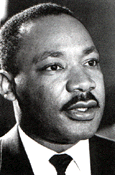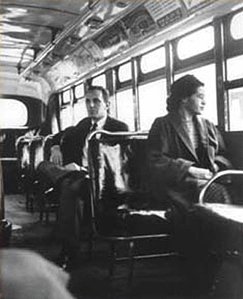|
|

Martin Luther King, Jr.
Part 1: Early Years
Martin Luther King, Jr. was born on Jan. 15, 1929. He was the son and the grandson of a pastor, so it is perhaps no surprise that he became a pastor as well. He also became a leader of the civil rights movements and one of the most famous people America has ever produced.
His name at birth was Michael, but he later changed it to Martin. When he was born, his grandfather was pastor of Atlanta’s Ebenezer Baptist Church. When Martin was 2, his father took over the pulpit and served for a great many years.
 Young Martin grew up in the segregated South. He attended, David T. Howard Elementary School and Atlanta University Laboratory School, which were full of African-American students, who at that time were not able to attend school with white children. Martin graduated from Booker T. Washington High School when he was just 15 and went right to college. Following in his grandfather’s and father’s footsteps, he attended Atlanta’s important Morehouse College, graduating in 1948 with a degree in sociology. He then moved north to Pennsylvania to study religion at the Crozer Theological Seminary. (During his stay at the seminary, he studied the teachings of Indian spiritual leader Mohandas Gandhi, who cautioned against violence as a way to bring about social change.) The seminary classes included students of varying colors of skin, and Martin was elected president of his senior class, a class that had mostly white students in it. He received his seminary degree in 1951 and then moved on to Boston University, from which he graduated in 1955 with a doctorate degree. Young Martin grew up in the segregated South. He attended, David T. Howard Elementary School and Atlanta University Laboratory School, which were full of African-American students, who at that time were not able to attend school with white children. Martin graduated from Booker T. Washington High School when he was just 15 and went right to college. Following in his grandfather’s and father’s footsteps, he attended Atlanta’s important Morehouse College, graduating in 1948 with a degree in sociology. He then moved north to Pennsylvania to study religion at the Crozer Theological Seminary. (During his stay at the seminary, he studied the teachings of Indian spiritual leader Mohandas Gandhi, who cautioned against violence as a way to bring about social change.) The seminary classes included students of varying colors of skin, and Martin was elected president of his senior class, a class that had mostly white students in it. He received his seminary degree in 1951 and then moved on to Boston University, from which he graduated in 1955 with a doctorate degree.
It was in Boston that Martin met his future wife, Coretta Scott, a strong and powerful woman who cared deeply about civil rights. They were married soon after and eventually had four children, two sons and two daughters.
 His doctorate in hand, King became pastor at the Dexter Avenue Baptist Church in Montgomery, Ala. He also was on the executive committee of the National Association for the Advancement of Colored People. A spiritual man who wanted to advance the cause of civil rights yet didn’t want to use violence to do it, King found himself in a position of leadership when many African-Americans decided to boycott the buses in Montgomery. (This was not the first bus boycott, however. That took place in 1953 in Baton Rouge, La.,) The Montgomery boycott, the spirit of which began with the refusal of Rosa Parks to sit at the back of the bus, lasted 382, more than a year. Not long after it ended, the Supreme Court ruled that laws requiring segregation on buses were illegal. His doctorate in hand, King became pastor at the Dexter Avenue Baptist Church in Montgomery, Ala. He also was on the executive committee of the National Association for the Advancement of Colored People. A spiritual man who wanted to advance the cause of civil rights yet didn’t want to use violence to do it, King found himself in a position of leadership when many African-Americans decided to boycott the buses in Montgomery. (This was not the first bus boycott, however. That took place in 1953 in Baton Rouge, La.,) The Montgomery boycott, the spirit of which began with the refusal of Rosa Parks to sit at the back of the bus, lasted 382, more than a year. Not long after it ended, the Supreme Court ruled that laws requiring segregation on buses were illegal.
During the boycott and his increasingly public presence, King was arrested and was also the target of violence and threats on his life. After one of his arrest, he wrote the famous Letter from a Birmingham Jail, outlining his beliefs and his hopes for the future of America.
Next
page > His Life Cut Short > Page 1, 2
|
|

 Young Martin grew up in the segregated South. He attended, David T. Howard Elementary School and Atlanta University Laboratory School, which were full of African-American students, who at that time were not able to attend school with white children. Martin graduated from Booker T. Washington High School when he was just 15 and went right to college. Following in his grandfather’s and father’s footsteps, he attended Atlanta’s important Morehouse College, graduating in 1948 with a degree in sociology. He then moved north to Pennsylvania to study religion at the Crozer Theological Seminary. (During his stay at the seminary, he studied the teachings of Indian spiritual leader Mohandas Gandhi, who cautioned against violence as a way to bring about social change.) The seminary classes included students of varying colors of skin, and Martin was elected president of his senior class, a class that had mostly white students in it. He received his seminary degree in 1951 and then moved on to Boston University, from which he graduated in 1955 with a doctorate degree.
Young Martin grew up in the segregated South. He attended, David T. Howard Elementary School and Atlanta University Laboratory School, which were full of African-American students, who at that time were not able to attend school with white children. Martin graduated from Booker T. Washington High School when he was just 15 and went right to college. Following in his grandfather’s and father’s footsteps, he attended Atlanta’s important Morehouse College, graduating in 1948 with a degree in sociology. He then moved north to Pennsylvania to study religion at the Crozer Theological Seminary. (During his stay at the seminary, he studied the teachings of Indian spiritual leader Mohandas Gandhi, who cautioned against violence as a way to bring about social change.) The seminary classes included students of varying colors of skin, and Martin was elected president of his senior class, a class that had mostly white students in it. He received his seminary degree in 1951 and then moved on to Boston University, from which he graduated in 1955 with a doctorate degree. His doctorate in hand, King became pastor at the Dexter Avenue Baptist Church in Montgomery, Ala. He also was on the executive committee of the National Association for the Advancement of Colored People. A spiritual man who wanted to advance the cause of civil rights yet didn’t want to use violence to do it, King found himself in a position of leadership when many African-Americans decided to boycott the buses in Montgomery. (This was not the first bus boycott, however. That took place in 1953 in Baton Rouge, La.,) The Montgomery boycott, the spirit of which began with the refusal of Rosa Parks to sit at the back of the bus, lasted 382, more than a year. Not long after it ended, the Supreme Court ruled that laws requiring segregation on buses were illegal.
His doctorate in hand, King became pastor at the Dexter Avenue Baptist Church in Montgomery, Ala. He also was on the executive committee of the National Association for the Advancement of Colored People. A spiritual man who wanted to advance the cause of civil rights yet didn’t want to use violence to do it, King found himself in a position of leadership when many African-Americans decided to boycott the buses in Montgomery. (This was not the first bus boycott, however. That took place in 1953 in Baton Rouge, La.,) The Montgomery boycott, the spirit of which began with the refusal of Rosa Parks to sit at the back of the bus, lasted 382, more than a year. Not long after it ended, the Supreme Court ruled that laws requiring segregation on buses were illegal.
